

Search london history from Roman times to modern day
231
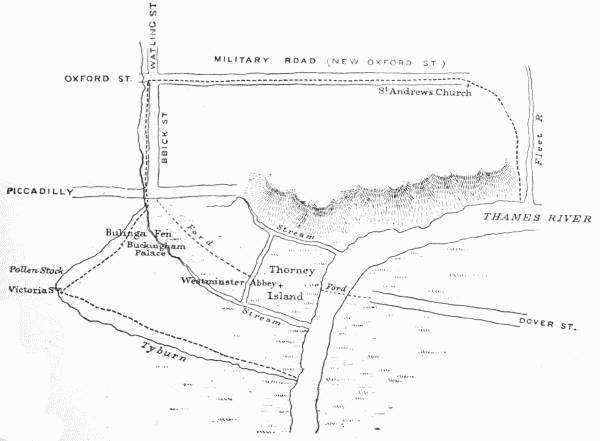
Let us turn to the sister city, as yet only Thorney, the Isle of Bramble. We all know the legend of St. Peter’s Hallowing. The legend became in later times an article of faith. The right of Sanctuary at Westminster was made to rest upon the sanctity of a place so blest as to have been consecrated by Peter: on the strength of this sanctity Westminster claimed the tithe of the Thames fishermen from Staines to Gravesend; and as late as 1382 a Thames fisherman representing Edric had the232 right to sit at the same table as the prior; he might demand of the cellarer ale and bread, and the cellarer again might take for him of the fish’s tail as much as he could with four fingers and the thumb erect.
Sebert was buried in the church, and his tomb is pointed out to this day. Walsingham says that when his grave was opened for the purpose of removing his body from the old church to the new, “his right hand was found perfect, flesh and skin, nails and bones, up to the middle of his arms.” And Robert of Gloucester writes:—
Bede makes no mention at all of Westminster Abbey. But the first Charter in which it is mentioned, that of King Offa of Mercia, in 785, calls it St. Peter’s. Bede’s History ends at the year 731; therefore the Abbey was founded between 731 and 785; or, which is more likely, the foundation was too small and insignificant for Bede to mention it. King Offa says, “I have given to St. Peter and the Lord’s people dwelling in Torneis, in loco terribili, quod dicitur aet Uuestminster.” There is another ancient charter, without date, still existing, under which one Ælfhelm grants lands to the Abbey. Considering the facts already dwelt upon—the religious fervour of the eighth century, the general desire for the monastic life, and the absence of monasteries or nunneries in London, we may very reasonably infer that Westminster would open her doors to the citizens, and these would endow and enrich her. So that the vanished foundation may very well have been a great and splendid monastery. As we have nothing to go upon but conjecture and inference concerning it, we may accept anything we please.
Then came the troubles of the Danes in the ninth century. It is not to be supposed that, when they were ravaging the whole island and destroying everywhere the religious houses, Westminster would be spared. Indeed, they seem to have actually occupied Thorney, according to Ethelred’s Chronicle, and to have been besieged there by Earl Ethelred. It certainly was not the only time that they visited a place so convenient and lying on the old high road. One visit was probably quite enough so far as the monks were concerned.
Edgar and Dunstan founded the Abbey anew—in this first great dissolution of the monasteries the younger monks probably took up arms and became fighting-men with the rest. However this may be, the monks of Westminster were lost: the new Abbey had to be served by monks from Glastonbury.233
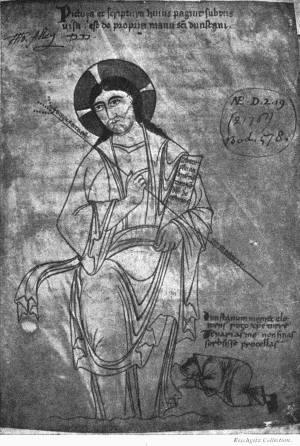
A document still exists, perhaps a forgery, but yet of great value, purporting to be the King’s charter granting estates to the Abbey. Its importance to us lies in the fact that, forgery or not, it does give the boundaries of the estate claimed and possessed by the monks. A very noble estate it is. You can lay it down on the map very easily. On the north it was bounded by the line of Oxford Street; on the east by the Fleet river; on the south by the Thames; on the west by the Tyburn and a line drawn from the present site of Buckingham Palace to Victoria Station, and thence to the outfall of the King’s Scholars’ Pond Sewer, east of Albion Terrace in the Grosvenor Road. Of this large manor a good portion was marsh-land, but there were pastures and meadows south of the present Oxford Street, and as far as Holborn and the Fleet. Later on the Abbey acquired the land between the Tyburn and the Westbourne, that is to say, that part now bounded by the Serpentine in Hyde Park and the two sewers known as King’s Scholars’ Pond Sewer and the Ranelagh Sewer.
234
This, however, was the demesne of the Abbey under Edgar’s foundation. He brought thither twelve monks of the Benedictine order from Glastonbury, and gave them presents in gold as well as in lands. Still it remained a poor foundation till the coming of the Confessor.
Of this church, that of Edgar, I suppose there is not a fragment left above the ground. Nor need we speculate as to the kind of church that it was.
Beside the Abbey, on the east side of it, it is said that King Cnut erected a royal palace. At least tradition ascribes the palace to him, and there are several reasons which make it as certain as can be that the King did build a palace of some kind—whether great or small—on Thorney. It is stated that he loved to converse with Wulnoth, Abbot of St. Peter’s. Now even in these days it is not so very easy to get from London to Westminster for the purpose of conversation, and King Cnut was the busiest man in the whole island, so it is at all events likely that he built some sort of dwelling near the Abbey. It is positively stated that his palace was burned in the time of the Confessor; there is a bull by Pope Nicholas II. (1058-1061), in which it is said that “the place where the church and monastery are built was anciently the seat of kings—therefore by the authority, etc., we grant and solidly confirm that hereafter, for ever, it be the place of the kings’ constitution and consecration, the repository of the Imperial Regalia, and a perpetual habitation of monks.” This is pretty plain. But there are other points which seem to indicate that Cnut was the first builder of a palace here. The story of the removal of St. Alphage’s remains from St. Paul’s to Canterbury proves the wholesome fear with which the King regarded the citizens of London. He caused his men to simulate riots and tumults at the City gates, so that when all the citizens hurried thither in hopes of a fight, the removal could take place unseen. He would not willingly remain within the City walls. Besides, he had with him his small standing army of 3000 huscarles (house men), whom he carried about with him. The housing of these men in London—men of a different nationality—would be an ever-present danger if they were billeted upon the citizens: one could not expect that the Londoners, who had twice beaten off Cnut’s father and once beaten off Cnut himself, would regard the intrusion of this army within their walls with satisfaction.
What kind of palace was that which Cnut erected? I am of opinion that it contained the central group of buildings associated with the name of Edward the Confessor, which remained, with many changes of windows and roof, down to the fire of 1834. Outside, there were the offices of state, the barracks, the guest-chambers, and so forth. We shall return to the subject again.
There is one more reason to believe that the palace of Westminster was built by Cnut. When Edric the traitor was beheaded, his body was “flung out of window into the Thames.” Some writers have stated that this would be impossible at Westminster. Quite the contrary; but it would have been impossible at London,235 for the simple reason that there were no windows overlooking the river, but that there was a great stone wall with towers and bastions running all along the river side: at Westminster, on the other hand, there were always houses built upon the banks with windows overlooking the river.
Let us meantime recognise Cnut as the founder of the “King’s House” of Westminster. It seems that both Harold and Hardacnut occupied the palace of Westminster from time to time.
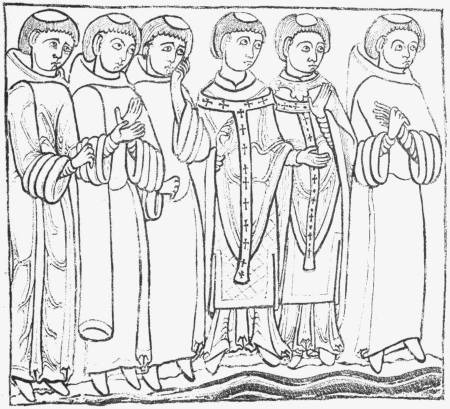
King Edward’s first charter, granted to Wulnoth and the monks of Westminster, was dated from the King’s House—in regis palatio—of London.
Edward the Confessor resolved to restore and to rebuild and to re-endow the Monastery of St. Peter. He was moved thereto partly because he was a special votary of that Apostle; partly because he had vowed a pilgrimage to St. Peter’s tomb at Rome, and his Council would not let him go; partly because to build and to endow a church was an act very pleasing to the Lord; and partly because he possessed that love of building found in so many kings of all ages and of all countries.
He carried his resolution into effect. He built a church worthy of his vow, and a church which was by far the noblest and grandest edifice in the country. It was236 the first English example of the cruciform church: it occupied an area nearly equal to that of the present church; the windows were filled with stained-glass representing passages in the life of our Lord and in the lives of the saints; it contained a noble organ; the altars blazed with gold and precious stones; the vestments of the priests were as magnificent as embroidery, silk, and cloth of gold could be made; the King and his warriors came to worship from the palace hard by; the rustics from the farms around came to worship side by side. In the splendour of the church, in the austerity of the monks, in the equality of the worshippers, there was taught to the world every day that religion regardeth not the rank or the power of a man. Of Edward’s church little now remains, only some pillars and passages, some substructures, the chapel of the Pyx, and some broken columns of the Infirmary Chapel.
Edward did not witness the consecration of his church. His last act was to sign the charter of the foundation. It was consecrated without him. His queen, Edith, sat in the King’s place, with her brothers, Harold and Gurth, and the new minster was consecrated by Archbishops Stigand and Aldred, while the King lay in his palace close by, slowly dying. After the consecration of the church the first function was the burial of its founder. The next was the coronation of Harold.
We shall have more to say, later on, concerning the coronation of our kings and queens. Let us conclude our notice of Saxon London with the coronation service of a Saxon king. It is that of Ethelred, and was probably followed word for word in the crowning of King Harold:—
“Two bishops, with the witan, shall lead him to the church, and the clergy, with the bishops, shall sing the anthem, ‘Firmetur, manus tua,’ and the ‘Gloria Patri.’
When the king arrives at the church, he shall prostrate himself before the altar, and the ‘Te Deum’ shall be chaunted.
When this is finished, the king shall be raised from the ground, and having been chosen by the bishops and people, shall, with a clear voice, before God and all the people, promise that he will observe these three rules.
The Coronation Oath
‘In the name of Christ, I promise three things to the Christian people, my subjects:—
First, That the church of God, and all the Christian people, shall always preserve true peace under our auspices.
Second, That I will forbid rapacity and all iniquities to every condition.
Third, That I will command equity and mercy in all judgments, that to me and to you the gracious and merciful God may extend his mercy.’
All shall say Amen. These prayers shall follow, which the bishops are separately to repeat:—
237
‘We invoke thee, O Lord, Holy Father, Almighty and Eternal God, that this thy servant (whom, by the wisdom of thy divine dispensations from the beginning of his formation to this present day, thou hast permitted to increase, rejoicing in the flower of youth), enriched with the gift of thy piety, and full of the grace of truth, thou mayest cause to be always advancing, day by day, to better things before God and men: that, rejoicing in the bounty of supernal grace, he may receive the throne of supreme power; and defended on all sides from his enemies by the wall of thy mercy, he may deserve to govern happily the people committed to him with the peace of propitiation and the strength of victory.’
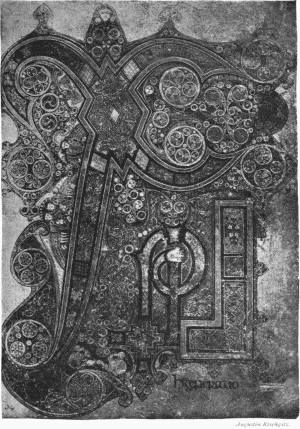
238
Second Prayer
‘O God, who directest thy people in strength, and governest them with love, give this thy servant such a spirit of wisdom with the rule of discipline, that, devoted to thee with his whole heart, he may remain in his government always fit, and that by thy favour the security of this church may be preserved in his time, and Christian devotion may remain in tranquillity; so that, persevering in good works, he may attain, under thy guidance, to thine everlasting kingdom.’
After a third prayer, the consecration of the king by the bishop takes place, who holds the crown over him, saying:—
‘Almighty Creator, Everlasting Lord, Governor of heaven and earth, the Maker and Disposer of angels and men, King of kings and Lord of lords! who made thy faithful servant Abraham to triumph over his enemies, and gavest manifold victories to Moses and Joshua, the prelates of thy people; and didst raise David, thy lowly child, to the summit of the kingdom, and didst free him from the mouth of the lion and the paws of the bear, and from Goliath, and from the malignant sword of Saul and his enemies; who didst endow Solomon with the ineffable gift of wisdom and peace: look down propitiously on our humble prayers, and multiply the gifts of thy blessing on this thy servant, whom, with humble devotion, we have chosen to be king of the Angles and the Saxons. Surround him everywhere with the right hand of thy power, that, strengthened with the faithfulness of Abraham, the meekness of Moses, the courage of Joshua, the humility of David, and the wisdom of Solomon, he may be well-pleasing to thee in all things, and may always advance in the way of justice with inoffensive progress.
May he so nourish, teach, defend, and instruct the church of all the kingdom of the Anglo-Saxons, with the people annexed to it; and so potently and royally rule it against all visible and invisible enemies, that the royal throne of the Angles and Saxons may not desert his sceptre, but that he may keep their minds in the harmony of the pristine faith and peace! May he, supported by the due subjection of the people, and glorified by worthy love, through a long life, descend to govern and establish it with the united mercy of thy glory! Defended with the helmet and invincible shield of thy protection, and surrounded with celestial arms, may he obtain the triumph of victory over all his enemies, and bring the terror of his power on all the unfaithful, and shed peace on those joyfully fighting for thee! Adorn him with the virtues with which thou hast decorated thy faithful servants; place him high in his dominion, and anoint him with the oil of the grace of thy Holy Spirit!’
Here he shall be anointed with oil; and this anthem shall be sung:—
‘And Zadoc the priest, and Nathan the prophet, anointed Solomon king in Sion; and, approaching him, they said, May the king live for ever!’
After two appropriate prayers, the sword was given to him, with this invocation:—
239
‘God! who governest all things, both in heaven and in earth, by thy providence, be propitious to our most Christian king, that all the strength of his enemies may be broken by the virtue of the spiritual sword, and that Thou combating for him, they may be utterly destroyed!’
The king shall here be crowned, and shall be thus addressed:—
‘May God crown thee with the crown of glory, and with the honour of justice, and the labour of fortitude; and by the virtue of our benediction, and by a right faith, and the various fruit of good works, thou mayst attain to the crown of the everlasting kingdom, through His bounty whose kingdom endures for ever!’
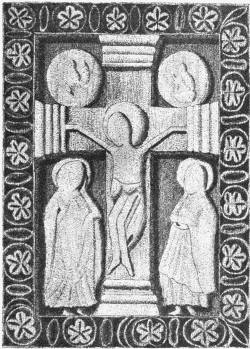
After the crown shall be put upon his head, this prayer shall be said:—
‘God of Eternity! Commander of the virtues! the Conqueror of all enemies! bless this thy servant, now humbly bending his head before thee, and preserve him long in health, prosperity and happiness. Whenever he shall invoke thine aid, be speedily present to him, and protect and defend him. Bestow on him the riches of thy grace; fulfil his desires with every good thing, and crown him with thy mercy.’
The sceptre shall be here given to him, with this address:—
240
‘Take the illustrious sceptre of the royal power, the rod of thy dominion, the rod of justice, by which mayest thou govern thyself well, and the holy church and Christian people committed by the Lord to thee! Mayest thou with royal virtue defend us from the wicked, correct the bad, and pacify the upright; and that they may hold the right way, direct them with thine aid, so that from the temporal kingdom thou mayest attain to that which is eternal, by His aid whose endless dominion will remain through every age.’
After the sceptre has been given, this prayer follows:—
‘Lord of all! Fountain of good! God of all! Governor of governors! bestow on thy servant the dignity to govern well, and strengthen him, that he become the honour granted him by thee! Make him illustrious above every other king in Britain! Enrich him with thine affluent benediction, and establish him firmly in the throne of his kingdom! Visit him in his offspring, and grant him length of life! In his day may justice be pre-eminent; so that, with all joy and felicity, he may be glorified in thine everlasting kingdom.’
The rod shall be here given to him, with this address:—
‘Take the rod of justice and equity, by which thou mayest understand how to soothe the pious and terrify the bad; teach the way to the erring; stretch out thine hand to the faltering; abase the proud; exalt the humble; that Christ our Lord may open to thee the door, who says of himself, I am the door: if any enter through me, he shall be saved. And He who is the key of David, and the sceptre of the house of Israel, who opens and no one can shut; who shuts and no one can open; may he be thy helper! He who bringeth the bounden from the prison-house, and the one sitting in darkness and the shadow of death! that in all things thou mayest deserve to follow him of whom David sang, Thy seat, O God, endureth for ever; the sceptre of thy kingdom is a right sceptre. Imitate him who says, Thou hast loved righteousness, and hated iniquity; therefore God, even thy God, has anointed thee with the oil of gladness above thy fellows.’
The benedictions follow:—
‘May the Almighty Lord extend the right hand of his blessing, and pour upon thee the gift of his protection, and surround thee with a wall of happiness, and with the guardianship of his care; the merits of the holy Mary; of Saint Peter, the prince of the Apostles; and of Saint Gregory, the apostle of the English; and of all the Saints, interceding for thee!
May the Lord forgive thee all the evil thou hast done, and bestow on thee the grace and mercy which thou humbly askest of him; may he free thee from all adversity, and from all the assaults of visible or invisible enemies.
May he place his good angels to watch over thee, that they always and everywhere may precede, accompany, and follow thee; and by his power may he preserve thee from sin, from the sword, and every accident and danger!
May he convert thine enemies to the benignity of peace and love, and make thee gracious and amiable in every good thing; and may he cover those that persecute and hate thee with salutary confusion; and may everlasting sanctification flourish upon thee!
241
May he always make thee victorious and triumphant over thine enemies, visible or invisible; and pour upon thy heart both the fear and the continual love of his holy name, and make thee persevere in the right faith and in good works, granting thee peace in thy days; and with the palm of victory may he bring thee to an endless reign!
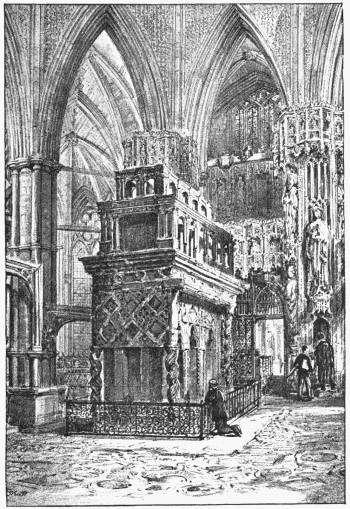
And may he make them happy in this world, and the partakers of his everlasting felicity, who have willed to make thee king over his people!
Bless, Lord, this elected prince, thou who rulest forever the kingdoms of all kings.
And so glorify him with thy blessing, that he may hold the sceptre of Solomon with the sublimity of a David, etc.
Grant him, by thy inspiration, so to govern thy people, as thou didst permit Solomon to obtain a peaceful kingdom.’242
Designation of the State of the Kingdom
‘Stand and retain now the state which thou hast hitherto held by paternal succession, with hereditary right, delegated to thee by the authority of Almighty God, and our present delivery, that is, of all the bishops and other servants of God; and in so much as thou hast beheld the clergy nearer the sacred altars, so much more remember to pay them the honour due, in suitable places. So may the Mediator of God and men confirm thee the mediator of the clergy and the common people, on the throne of this kingdom, and make thee reign with him in his eternal kingdom.’
This prayer follows:—
‘May the Almighty Lord give thee, from the dew of heaven, and the fatness of the earth, abundance of corn, wine, and oil! May the people serve thee, and the tribes adore thee! Be the lord of thy brothers, and let the sons of thy mother bow before thee: He who blesses thee shall be filled with blessings, and God will be thy helper: May the Almighty bless thee with the blessings of the heaven above, and in the mountains, and the vallies; with the blessing of the deep below; with the blessing of the suckling and the womb; with the blessings of grapes and apples; and may the blessing of the ancient fathers, Abraham, Isaac, and Jacob, be heaped upon thee!
Bless, Lord, the courage of this prince, and prosper the works of his hands; and by thy blessing may his land be filled with apples, with the fruits, and the dew of heaven, and of the deep below; with the fruit of the sun and moon; from the tops of the ancient mountains, from the apples of the eternal hills, and from the fruits of the earth and its fulness!
May the blessing of Him who appeared in the bush come upon his head; and may the full blessing of the Lord be upon his sons, and may he steep his feet in oil!
With his horn, as the horn of the rhinoceros, may he scatter the nations to the extremities of the earth; and may He who has ascended to the skies be his auxiliary for ever!’
Here the coronation ends.”
Trying to avoid privacy and cookie settings overwriting content